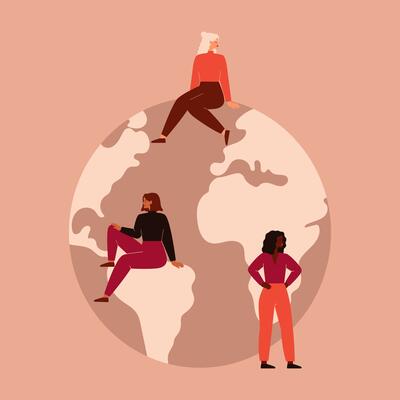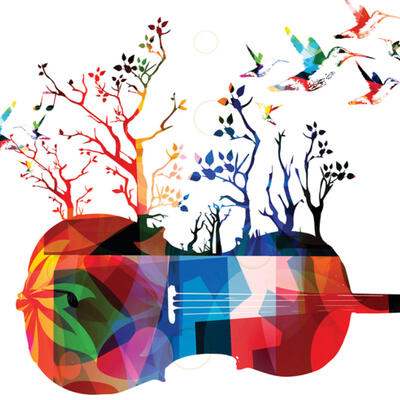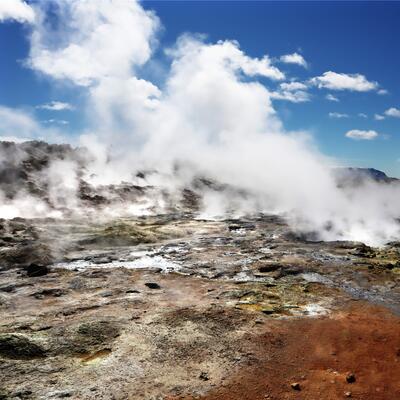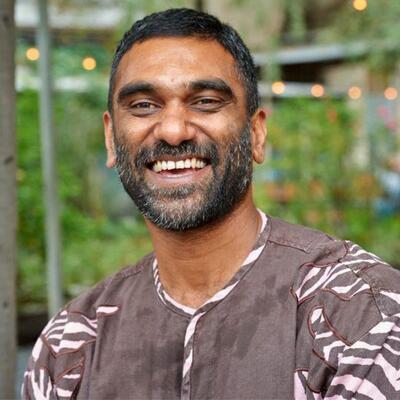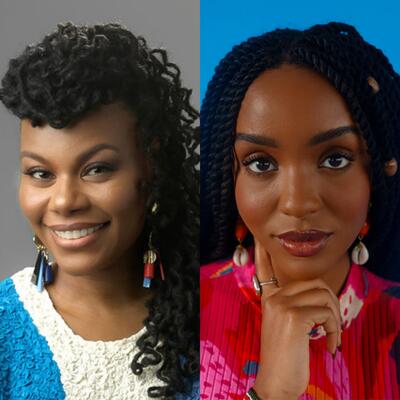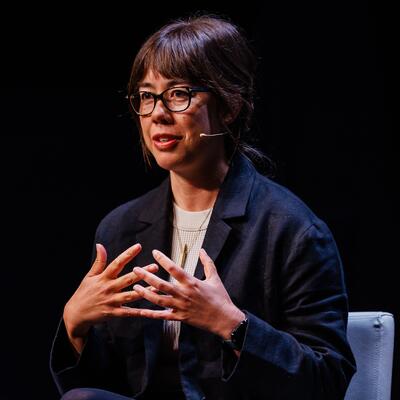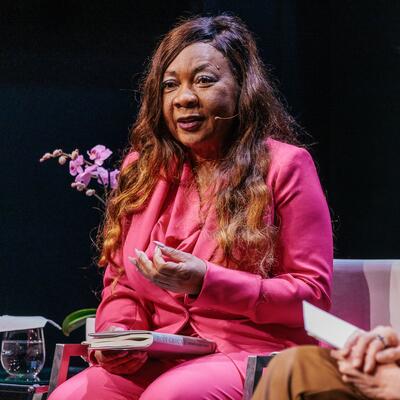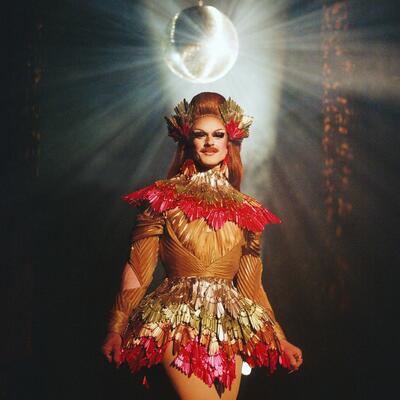
Drag Queen Pattie Gonia: Bringing Joy to Climate Action
Guests
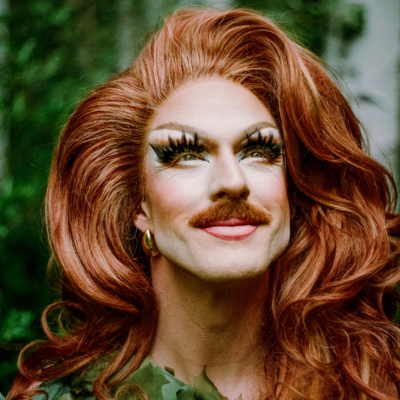
Pattie Gonia
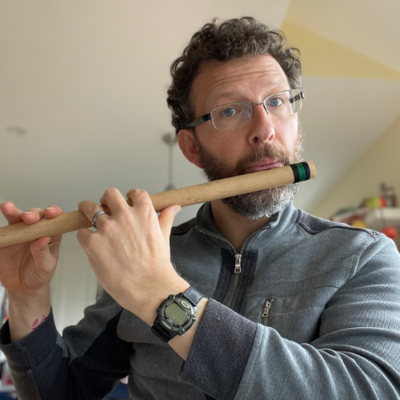
Mike Roberts
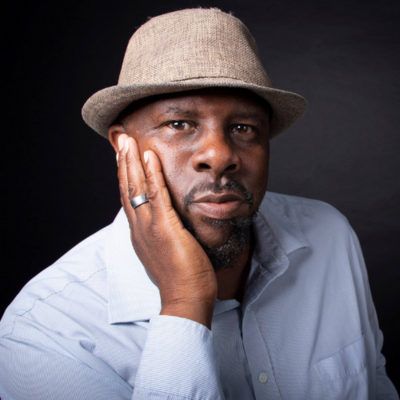
Will Hammond Jr.
Summary
Addressing climate change can take many forms. For some, like the R&B duo Mike Roberts and Will Hammond Jr., it’s creating music videos to educate the public about heat pumps and geothermal energy.
“We're sort of using entertainment and education to sort of give them that bridge. I call it ‘edutainment,’” says Hammond. “When I finally met Mike is when I started to wake up to like, here are the things that you can do in your home, here are the things you can do in your world that will really be a part of that next level.”
Mike Roberts was volunteering with climate group The Switch is On when he realized he could put his music writing skills to good use. He says writing a song about electrification wasn’t exactly easy, but he liked the challenge.
“I gravitated towards the heat pump because if you look at energy usage in the home, heating and cooling is by far the biggest share of energy usage. It's well over 50 percent for most people,” Roberts says. And it was easy to make it sexy and soulful.
“I mean, it's right in the name. The heat pump like, all the sophomoric double entendres like they just come pouring out.”
Last year, Jamie Beard of Project Innerspace asked the duo to write a similar song about geothermal energy. They performed their song, “Our Love is Geothermal” at New York Climate Week.
Climate advocate Pattie Gonia uses drag performance to raise awareness and support for environmental and social justice issues. Pattie Gonia is a big believer that we need to make the climate and environmental spaces more fun and not take ourselves too seriously.
“ That's what we really need in the environmental space is joy, is celebration. I think we forget that,” says Pattie Gonia. And by being more inclusive, we’ll be more powerful, together.
“We can't just throw away half of the environmental community because they might think a little bit differently. And actually how we create the environmental future that we need is building those bridges across difference, is realizing that everyone can make change in unique ways.”
Pattie Gonia images credit Mitchell Overton and Maxwell Poth
Episode Highlights
04:00 – Wyn on his childhood and experiencing homophobia
06:00 – Drag culture
11:30 – The birth of Pattie Gonia
16:00 – Joy as a form of resistance
20:30 – Diversifying the outdoors industry and experience
23:50 – The power of an invitation outside
31:50 – Mike Roberts and Will Hammond Jr. on their meeting and collaboration
origin of heat pump song
36:45 – Origin of song “I’m Your Heat Pump”
41:30 – Your climate venn diagram
45:30 – Value of continued education for people of all ages
49:00 – Origin of “(Our Love Is) Geothermal” song
Resources From This Episode (6)
Full Transcript
Note: Transcripts are generated using a combination of automated software and human transcribers and may contain errors. Please check the actual audio before quoting it.
Ariana Brocious: I’m Ariana Brocious.
Austin Colón: I’m Austin Colón.
Ariana Brocious: And this is Climate One.
[music change]
Austin Colón: On the show we’ve talked about lots of practical ways you can address climate in your own life – from things like electrifying your home to building a strong local community. This week we’re excited to feature a couple of people who confirmed for me that creativity and self expression are also important avenues for climate action.
Ariana Brocious: Absolutely. Two of our guests today – Mike Roberts and Will Hammond Jr. – make amazing music videos about things like heat pumps and geothermal energy. And honestly, I’ve heard some bad climate songs in my time. These ones are GREAT. Funny, smart, and sultry…We’ll get to listen a bit later on.
Austin Colón: You know, I had kind of a reverse path – I went to school for music production and wanted to work in the industry as a composer and producer. But after realizing that I wanted to do work that has more of an impact on issues I care about, I decided to use those skills I learned in music school in a different way. And long story short - that's why you’re stuck with me now!
Ariana Brocious: You mean lucky to have you! And as we’ll talk about, there are so many ways to use your skills for climate action. Our first guest, drag queen and environmentalist Pattie Gonia, is a big believer that we need to make the climate and environmental spaces more fun. To not be so precious and not take ourselves too seriously.
Austin Colón: Yeah. Pattie really helped me understand joy is an effective means of resistance. We have to find a way to, not only to hold onto joy, but also lean into it. Especially now, when we’re seeing climate policies being destroyed left and right in Washington.
Ariana Brocious: I couldn’t agree more. I’ve been aware of Pattie’s work for several years and it was such an honor to talk with her. Out of drag, Pattie is Wyn. I talked with them about Wyn’s childhood and Pattie’s origin story.
Ariana Brocious: You grew up as a closeted queer kid in eastern Nebraska. How did that shape your early experience with your sense of self and also your experience with nature?
Pattie Gonia: I'm so lucky to be from the Midwest. I think it gets written off. I think it gets thrown to the side, but I think the Midwest really taught me that you can't just throw people away, even when they want to throw away you. I think it taught me to create bridges across difference. I think it taught me a lot that I'm glad I know, and I would have changed the way that I learned it, but I'm glad I learned it. And I think all of this really deeply applies to my environmental work because I've really learned that we can't just throw away half of the environmental community because they might think a little bit differently. We can't throw away people. And actually how we create the environmental future that we need is building those bridges across difference, is realizing that everyone brings a different, powerful perspective and unique talents and can make change in unique ways. And it might look different than what we think, but Nebraska really taught me that. And so I'm really grateful to be from there. I'm really glad I'm not there now.
Ariana Brocious: I want to figure out if I'm understanding you. Did you feel that you were not welcome in environmental spaces when you were younger? Maybe before you came out, did you feel even when you did come out that that was not a space that you were as welcome?
Pattie Gonia: For me, growing up in Nebraska, nature was my first safe space as a queer kid. I knew I was queer at a very young age. I mean, like, my first memories ever were in a backyard underneath this giant 80-year-old oak tree and I think that that does something to you. I think you learn to love nature in a way because it was my playground. It was my imagination. It was where I felt accepted. And then, you know, in middle school, high school, doing sports, doing Boy Scouts, so much of the space that I loved outside in nature became a place where I experienced the most homophobia I'd ever experienced before. And it got complicated because when I was also being called, an F slur or being called gay. I was also being told that because I was queer, I was unnatural and I was wrong. And so I really grew to be disconnected from nature. I really grew to love more city spaces and those became my safe spaces. And I think that's part of the narrative writ large in the queer community to run to big cities for that acceptance.
But in a way, I feel like I'm so glad that through Pattie, I ran into the forest and really found my people and found myself again and I want that for every queer person. I want that for every person of color. I want that for anyone who maybe didn't get the outdoors as much or didn't get as much access as a kid to really realize that nature and the outdoors are just as much your space as they are anyone else's. And so that's at the core of my environmental work is getting people outside. I think anyone that works in the outdoor industry or outdoor education is doing some of the most important environmental work out there because we're getting people connected to this thing we're telling people to fight for.
Ariana Brocious: Yeah. We'll talk a bit more about your work getting people outside in just a minute, but I want to spend a few moments talking about the birth of Pattie. And before we get into that, if you could just help level set a little, how would you explain drag or what a drag queen is to someone who maybe doesn't have a good sense of that?
Pattie Gonia: Yeah, I mean, I grew up not understanding anything of what drag was. I wasn't exposed to it, I'd never known a drag queen before, and I think I also had kind of a lot of internalized homophobia of like, well, I'm gay, but I'm not like that. And that's because I was told as a kid, hey, we accept you as gay. But we don't want you to do drag, or paint your nails, or to be trans, or to be friends with any trans people. And I think I learned really early on that conditional love, or love with conditions, is not love. It's a special form of hate. And I'm grateful I know real love now. I truly try to put love at the middle of my environmental action, because I think that's what we need more of as well. But, for me, drag as an art form, that oftentimes queer people, but oftentimes straight people too, do to perform and use gender as the vehicle for that performance. So oftentimes people that are born as male might dress as female. Oftentimes people that are born as female might dress as male. It is not a mockery of, it is a complete reverence of gender and expression and of performance. It's a playground where anything is possible. It's a playground where I can imagine a newer and better and different world full of love and full of community and full of expression. And for me, why I do drag, personally, is because I wasn't granted that chance as a kid, as a queer kid, to express my femininity. So for me, Pattie and my journey with drag is playing catch up to a lot of the femininity that I wasn't allowed to express.
Ariana Brocious: Hmm. That's really nice to hear. So tell us how Pattie came to be, how you, I don't know, what's the appropriate term? How you created Pattie?
Pattie Gonia: Yeah, how she, how she was born, how she was born.
Ariana Brocious: Do you refer to her in third person?
Pattie Gonia: Sometimes. I don’t know, it’s this dance I do with myself. You know, it's so much me, like the, uh, there's not really a separation anymore, which I'm really grateful for because I think through creating this alter ego or this persona, you get to discover new parts of yourself. And I think that's also a really misunderstood part of drag is oftentimes people think, you know, that drag queens or drag performers are hiding who they are. But it's like, the one time I can't hide is when I look like this. So, for me, it's been a way to, to figure out, uh, pieces of who I actually am and my truth, and reveal my truth. But, yeah, Pattie was born in a very unconventional way. Most drag performers are, you know, born in nightclubs or are born on a theater stage. But for me, I was born in the middle of the Never Summer mountain range in Colorado on a backpacking trip. The little backstory to that and kind of why that even happened is because at the time in my 20s, this was like in 2018, I was a photographer and I'd gone to this photography conference to teach at it and there was a dance party at the end of it. And the invitation for this dance party was to go as whatever you wanted to go as for a night. And I'd never done drag, I'd never even dipped my toes into that world. So I literally went into West Hollywood in California and bought this pair of heels and put together a drag outfit and went out that night as a gingersnap. Photography pun included and I went out that night and it was so powerful and honestly scary to me to look in the mirror and see so much of the femininity that I had left out of my life, looking right back at me. And I went out that night and I felt so free, and it felt so fun, and it felt so, like, lighthearted at the same time. And what I wasn't thinking about at the time was that there were hundreds of photographers there, all taking photos, and that photos would eventually make their way back to Nebraska. And to people in my hometown, and people in my church at the time, and to my family.
And when photos eventually did make their way back, after feeling such immense freedom, I was met with complete radio silence from so many people that I thought were my friends or my family. And it was a really hard summer because I was questioning, why are all these people that loved me and accepted me suddenly so silent in my life because I had made them uncomfortable. And what I know now that I didn't know then is that, again, love with conditions is not love, it's a special form of hate. But also, that when they were saying, how could you ever do this? Why would you ever do this? What they actually were saying to me is, how dare you show me what freedom looks like? How dare you show me what expression and self love could look like? And they were really afraid of it. And so at the end of that summer, I went on a backpacking trip with a few of the only friends that I really felt like I had in my corner at that time. And I was packing for this backpacking trip. I was looking into my closet at my backpacking backpack and saw these high heel boots that I had shoved so deep in the closet because I was like, I'm never going to do this again. It's too painful. It's too hard. And I just said, what if, and I packed them in my backpack and, At the crest of the trail, right where we went over the Continental Divide, I decided to whip these boots out. It was like a ridiculous five pounds of extra weight in my pack I did not need, but I put them on and strutted the trails for the first time as Pattie. And as the kids do these days, like took some photos, took some videos. You know, came back from the backpacking trip, set a video to a Fergie song, posted it online to this joke Instagram account, and was like, we'll see what happens. And, you know, woke up the next day to millions of views on this video. And I think the thing that still surprises me to this day, though, wasn't just the views, but was the messages I got from queer people in the science fields and research fields and National Park Service messaging me saying, Hey, you know, we've never done a Pride in our national park. Would you come and, and help do that? And now six years later, we're throwing prides in national parks and in small outdoor towns and headlining Denver pride and making pride for people who would have never had it before. And like, that is, everything I could want and more. And I think that's what we really need in the environmental space is joy, is celebration. I think we forget that. And I think we really, really, really need to look at why more people aren't joining the environmental movement. And I think a truth that we're not ready to swallow as an environmental community is that our spaces are just as gatekept and are just as hard to enter and inaccessible and like serious and it's keeping people out. It's not inviting people in and it's oftentimes spaces just for the ultra wealthy or ultra privileged and I hate that. I want an environmental movement that looks radically different than the one that does now because when I go to climate week in New York City, it is not what climate action really looks like in my life. It is not what I see out there, people at the grassroots level. And I think we need to celebrate that more and celebrate the people that are making changes like that.
Ariana Brocious: So help us make that connection more clearly. Cause I think you really embody these multiple passions. And the environmentalism, and especially the climate aspect is a really strong part of your work. How do you connect, you know, the world of LGBTQAI plus all of that, and you know, that kind of activism with environmental activism, with social justice, with climate activism?
Pattie Gonia: You know, I think at the end of the day, we have so many people who have so many incredible skills in the social justice movement, whether that's fighting for their human rights like we did in the civil rights movement with BIPOC people, whether that's the queer rights movement and fighting for the ability to even be seen and recognized or the ability to marry. We have amazing social justice tactics there. Why are we not applying that to the environmental justice field? Why is the environmental justice community not advocating for social justice issues more? I think we forget in a very colonized world that we are not apart from nature. We are a part of nature. That's why I think that every single environmentalist should be passionate about Palestine and Gaza and everything happening in every war because the U.S. military industrial complex is the world's biggest polluter. By far. Because if we're not fighting for people on this planet who are a part of nature, what are we even doing? So I don't think it's separate. It's not separate in my head. Like, the environmental movement is the social justice movement and vice versa. There's not a separation. And I think I understand the need to create these different communities. And I love that these spaces exist, but there's not a separation in my mind. We are nature and we are a part of it. It's time to step up to the plate for people and planet.
Ariana Brocious: What you're saying resonates a lot with a woman we interviewed, Leah Thomas, who wrote a book, Intersectional Environmentalist. And she says very similar things about the fact that you don't leave parts of your identity behind, and that when she was asking her non Black friends to participate in the Black Lives Matter movement, they were kind of like, well, I'm a climate activist. That's not my issue. And she was saying, Well, why not? It's everybody's issue. So I understand what you're saying. And one thing I think that's really a strength of your persona of Pattie, of the way you present yourself publicly is this blend of very heartfelt, serious, content on things like your Instagram feed, let's say mixed with really fun, really joyous, really colorful posts about like drag queens skiing. Is that intentional? Is that, you know, a way to kind of tie together some of these different groups of people?
Pattie Gonia: Yeah. I want people to know that I am just as depressed as they are sometimes, I feel just as hopeless as they do sometimes. But what I'm so grateful that drag has taught me, that I think every person who wants to fight for this planet or the people on it, could take away from drag is that drag shows me that joy is strategic. Joy creates momentum. Joy has a purpose. It is that strategy, that special ingredient, because the people in power, the people who want you to believe that you can't make a difference in this world, want you to feel apathetic. They want you to feel completely paralyzed, like you can't do anything. They want you to forget your power. And I think that joy and celebration reminds us that there are so many people doing such incredible things. The good news does not get as much attention as the bad news.But there are things happening, and joy is that strategy, joy is that superpower. And that's not saying ignore the issues that are happening, it's saying we can focus on the issues, or we can also stay focused on the solutions. And what I love most that drag has taught me, is that you can take fighting for something seriously without taking yourself too seriously. And I've deeply learned the importance of that because when I take something so seriously, that momentum is not there. When I take something too seriously, I oftentimes am not collaborating. When I take myself seriously, like I'm forgetting the why. And the why isn't just to build a future where we decarbonize the planet. I also want to build a world culturally that I want to live on and with. And that's a world that is connected. That's a world that is full of love and joy. So for me, I can't do what I do without joy. And it's not in absence of all the issues, it's because of that. It is a strategy.
Austin Colón: Coming up, how to make the outdoors more equal for all people:
Pattie Gonia: If you are a person of color or you are a queer person growing up in America, the outdoors looks different. It has more barriers, especially if you are lower income. It is not just as easy as stepping outside.
Austin Colón: More from drag artist and environmentalist Pattie Gonia, when Climate One continues.
Ariana Brocious: Help others find our show by leaving us a review or rating. Thanks for your support!
This is Climate One. I’m Ariana Brocious. Let’s get back to my conversation with Wyn, also known as Pattie Gonia. I’ll let them introduce themselves.
Pattie Gonia: My name is Pattie Gonia. I'm a drag queen. I'm an environmentalist. But I also really want to give this interview as Wyn, who I am out of drag. Because believe it or not, I do not walk through the world with 13 pounds of makeup on my face. And I think it's a really interesting parallel, my drag and my drag persona, to all of us with like the work we do or the titles we have. I think there's so much in this environmental space where, you know, we work for sustainability, for XYZ, we host this thing, we do this thing, but really we're all humans trying to figure it the hell out, and I am right there with y'all. And so, I think it's really important, regardless of our titles or what we do in this world, that we see each other as human beings. And that's why every interview I do, I really want to come to it as Wyn too, out of drag, so that you see my humanity. That you see what I do in my daily life because my actual climate action looks a lot different than what you might see on the news or online as Pattie. If Pattie or drag is like my wizardry or my wizard persona, I am Muggle and I walk through this world as a Muggle too.
Ariana Brocious: Well, thank you for sharing that. And I think that is also clear in some of the content you make because a lot of the videos featuring Pattie also feature Wyn. You see, I see both sides of you, you know, represented in the same video in and out of drag, which I think is a really interesting way to showcase, you know, the multitudes that we all contain.
Pattie Gonia: Same.
Ariana Brocious: So you are a co-founder of the Outdoorist Oath, and this is a nonprofit that gets BIPOC, which is Black, indigenous people of color and queer people of all kinds, and femmes into the outdoors through community and education. So tell us a bit about how that came to be and the successes you've had in getting more people, more diverse people outside.
Pattie Gonia: Yeah, I think the first thing I would say is that there is a whole entire movement of diverse advocates working on the outdoors to diversify the outdoors. It is not just me or my co-founders in the non profit or the employees. It is a movement that's happening to really diversify this whole entire industry and pathway to the outdoors that is built on a very colonized understanding of the outdoors. I think it's really important to lay a foundation that outdoor access is not equitable at all. If you are a person of color or you are a queer person growing up in America, the outdoors looks different. It has more barriers, especially if you are lower income. It is not just as easy as stepping outside the green spaces you have access to in your cities are going to look completely different too. I mean, we can take this as far as the 20-degree temperature difference in neighborhoods that are primarily Black neighborhoods in a place like Portland compared to white neighborhoods where there's way more trees. And when we look at outdoor access, there's transportation barriers, financial barriers, education barriers. I was so lucky to be raised, you know, with Boy Scouts, even though it caused me a lot of trauma. I learned outdoor skills. I can't recall a single person of color in my troop or at a summer camp that I went to. So it's just different from the ground level. And so the impetus of our non profit and of just my work writ large in the outdoors is that if those opportunities aren't equal, let's create opportunities with zero barriers for people to get outdoors and fall in love with nature. Because I believe if you can get people to actually see this nature face to face, fall in love with it, fall in love with the people they're sharing the trails with, well then they're gonna fight more for it. We're asking a lot of people right now in the environmental movement to fight for something they don't even have a relationship to.
You know, Gen Z spends more than half their week on their phone. I don't fault them for it. Look at the world we've created for them outside. Why would they ever want to go outside when we've created suburbs where the only green spaces are a narrow patch on a six lane highway, or where the options for them to hang out is between like a Popeyes and a McDonald's? Like, why do we not have third spaces that are green spaces? Why do we not encourage outdoor education? So it's by design. So don't fault these people for it. But I do think that we can change a lot, and so our non profit, The Outdoorist Oath, along with, again, many others are working to rewrite that from a community standpoint in the outdoors and to really diversify the outdoors and provide opportunities for people to just smile outside. What could be better than that?
Ariana Brocious: Yeah. Yeah. So, how do you encourage people that are fans of Pattie, fans of Wyn, take part in this bigger project of, of supporting everyone being outside, of being active in climate action, of all these things that you personally represent.
Pattie Gonia: I think the most underrated, completely free, completely accessible climate action we could all take today, or tomorrow, is the power of an invitation. Especially when it comes to going outside. When I think about me like entering into the climate movement or into the outdoors, it was through a friend. It was through someone saying, Hey, come backpack with me. Hey, come out for a day hike with me. Hey, I know you might not have all the gear you need. I got you. Or I know where you can get it or where you can rent it. There is so much power in that and at the best case scenario people end up with new lifelong hobbies, new friends, a new passion, a new relationship to the nature in their own backyard and at the worst that happens they get some cute pics for their tinder or bumble whatever, you know like I'm just like, let's let's get people outside. Let's invite people outside. So I think yeah what it really looks like if people are fans of what I do is to really harness the power, their own power of an invitation to go outside, an invitation to go to a climate rally, an invitation to go to a Black Lives Matter rally, like, that is what's up. And that's all possible, and it's free 99, baby.
Ariana Brocious: Free 99. Ah, that's great. I like that. I want to ask you about a project you did recently, fairly recently. You wrote a climate anthem song called Won't Give Up with Quinn Christopherson and cellist Yo Yo Ma, who of course is internationally renowned. And it's a really beautiful video, inspired and filmed, on the Exit Glacier, I think is right in Alaska. Can you tell us a little bit about what, first of all, you are a musician, that's a piece of your work, but this idea of setting the bar to write a climate anthem, you know, a song that can kind of inspire can motivate people, that's also beautiful musically. Where did that inspiration come from? And how have you seen it resolve?
Pattie Gonia: Yeah, I love looking at history. And I think that if we look throughout history, song and music is a language that we all speak. So I really wanted to explore what it would look like to write a song that had climate in mind. I don't know if it's any climate anthem that we wrote, but I definitely wanted to contribute to giving people something that they could sing, the front lines of a climate march or they could have in their hearts as they go through their life and their world. And the story of the song is actually really interesting because it was a really important journey for me of kind of realizing and uncovering a new core or new side of my environmentalism. The song originally was written as a requiem for a glacier, to be performed at a funeral for this glacier. And I really wanted to go up to Alaska and give a funeral, perform a funeral processional for this glacier that was dying, that was calving into the ocean, you know, parts of this glacier two stories high, just falling straight into the ocean right in front of our face. And through working with Quinn, who's an amazing queer indigenous songwriter from Alaska, and through working with Yo Yo, we really flipped that script of giving up to not giving up, and titled the song, Won't Give Up.
Because there are so many people, including us, fighting for a different world. There is so much energy in this world who wants us to believe we can't affect change, but we can. You know, what I think I learned most in this project is that, like, inaction is an active choice. And what I mean is that doing nothing is doing something. So I think it's really important to think about everything that is happening, all the solutions that are happening, that do exist. And so when we ended this project, we ended with a song that did have hope written through every line. We did also exercise collaboration through writing the song together, through working with other BIPOC or queer or female filmmakers and crew to bring this project to life. We met with local Indigenous organizations and strengthened ties and got to fundraise $66,000 for queer Indigenous orgs in Alaska when we were up filming this project. It was a dream and it showed me what's possible when you do take action. It showed me what's possible when instead of thinking that climate action is just donating five dollars here or there or marching on the front lines of a protest, which are great things, climate action really happens when you take what you're good at and who you are, and apply it to what you care about in this world.
And I would add a little other thing. So many of us have unique access or speak languages that other people don't speak. Some people might speak corporate language. Some people might speak spreadsheet language. The climate movement needs everybody. We need bakers. We need accountants. We need artists. We need poets. We need caregivers. We need all these people to come together and give what they can to make action that they and probably only they can take.
Ariana Brocious: Pattie Gonia is a drag queen and environmentalist. Pattie and Wyn, thank you so much for joining us on Climate One.
Pattie Gonia: Thank you so much, Ariana.
Ariana Brocious: Here’s “Won’t Give Up,” featuring Pattie Gonia, Quinn Christopherson and Yo Yo Ma.
Coming up, finding joy and purpose within the climate space through music:
Mike Roberts: For me, I realized, okay, if I'm going to stay in this for the long haul, I've got to really find that aspect of the things that I love and bringing the things that I love into my climate work.
Ariana Brocious: That’s up next, when Climate One continues.
Austin Colón: This is Climate One. I’m Austin Colón.
Ariana Brocious: And I’m Ariana Brocious.
Austin Colón: I can’t remember exactly when I first heard the song “I’m Your Heat Pump” by the R&B duo Mike Roberts and Will Hammond Jr. But once I heard it, I couldn’t forget it.
Ariana Brocious: Yeah. It’s an incredible blend of humor, sass, science, and silky sensual soul… I mean, it makes heat pumps sexy!
Austin Colón: Yeah, not an easy thing to do. I had a chance to sit down with the men behind the music and get a sense of how they found this path to climate action.
Austin Colón: Mike Roberts, Will Hammond Jr., thank you so much for joining us on Climate One.
Mike Roberts: Thanks for having us.
Austin Colón: You both collaborated on a song called I'm Your Heat Pump, which became a bit of a viral hit because, you know, the style of the song, and of course the amazing video, and being featured on KQED. I know that I'll never think of a heat pump in the same way again. Ha ha ha. And so, uh, before we get into it, let's hear a bit of I'm Your Heat Pump.
[“I’m Your Heat Pump”]
Austin Colón: All right. We'll, we'll talk more about the song in a moment, but first, Will, in 1990, you were credited as a writer on Tara Kim's hit, Hold You Tight. What was your journey from hit songwriter to meeting Mike and becoming what I describe as the sultry voice of a heat pump?
Will Hammond Jr.: Thank you. Thank you for calling me sultry. Well, Mike and I met years later. My kids were in preschool and at a French immersion school in Berkeley. And so, I would see Mike, you know, with his guitar all the time. He was doing some classes at the school. And we talked about connecting as parents to form a band, you know, for the school. Cause we would play some of the events at the school. And so it turned, you know, that innocent little like band turned into a bigger, bigger thing later on. But yeah, it was really fun to interact with him because he was a really amazing musician. And, he's an amazing guy as well.
Austin Colón: All right. So, so to pick up on that point, Mike, when did each of you start realizing that climate was an issue that you cared about?
Mike Roberts: Yeah, well, I would say for me, I mean, I've always been, interested in environmentalism and, and, you know, concerned about what's, what's going on with the planet, and, and just, I would say aware, but not really involved until maybe seven or eight years ago, I sort of woke up to the reality of climate change and the fact that I was not really doing anything. You know, I was voting for the right people. I was certainly supportive of action, but I wasn't really doing anything to make the change. I wanted to see in the world. And that's when I started getting involved volunteering for different organizations. I started out doing some tabling for East Bay Community Energy, which is now Ava Community Energy. From there, I got involved with The Switch Is On, who produced the I'm Your Heat Pump video, and then also Citizens Climate Lobby, and so I've done a number of things and become a very active volunteer.
Austin Colón: Cool. And what about you, Will?
Will Hammond Jr.: Well, I think for me, I have always been in education when it came to teaching about climate sustainability, but also being aware of my carbon footprint. And so I think on the fringe, I've always been very curious about what we are doing to make sure that we can keep the planet safe for our, you know, future generations. But when I finally met Mike is when I started to wake up to like, here are the things that you can do in your home, here are the things you can do in your, in your world that will really be a part of that, that next level. And so. It was interesting when we talked about heat pump, because I have no idea what a heat pump was. And, you know, I've lived in my home for about 12 years with a really bad heating system. And it was like, Oh, wait, you're telling me you can get a heat pump? And it would actually do both for the summer and the winter, you know. Again, and those things are really fun because when you figure it out. You're like, oh, wow, like this is something I can actually do and, you know, it's more experiential learning than it is about just, home improvement. And even now I just told Mike today I got a job in climate careers, you know, being a youth development specialist, so I'm now teaching youth about how to get careers in climate.
Austin Colón: Wow. That's awesome. That's awesome. Yeah. So how did the heat pump end up being chosen as the topic for the song?
Mike Roberts: Yeah, that's a good question. I kind of had heat pumps on the brain. because I had heard about electrification primarily through an electrification fair that the city of Berkeley did like back in 2018 that kind of put it on my mind and it just so happened that we were in the process of planning a big remodel of our house here in North Berkeley, and we took the opportunity to fully electrify the house, including putting in a heat pump. So I figured, you know I'm sort of a relatively early adopter. I can help other people to learn about these things. First of all, you know, a lot of people like Will just like aren’t aware that it's, it's an option, right? And, and why, and what's great about it, right? So sort of became involved as a messenger. And so by the time I came around to thinking about writing music, for climate and specifically for electrification, I mean, it came up through a conversation that I had with a Switch Is On staff member, and we were just kind of spitballing ideas. And when she learned that I'm a musician and write music, she's like, oh, you should write about electrification. I'm like, yeah, yeah,
Austin Colón: Yeah. As if that's like an easy thing to wrangle with.
Mike Roberts: Sure, I'll just write a song about electrification. But yeah, I mean, I like a weird challenge like that, I guess. And so the idea stuck in my head and she was incredibly encouraging, you know, and really like, inspired me to take it seriously. It's like, Oh no, this isn't a joke. Like you should actually try this. And then, I guess the reason why I gravitated towards the heat pump is because if you look at energy usage in the home, heating and cooling is by far the biggest share of energy usage. It's well over 50 percent for most people. As opposed to cooking, which is very important as well, you know, induction stoves are great and it's important to replace our gas stoves with electric and induction, but that's only like 3 to 5 percent for most people of usage. So if we want to make our biggest impact, we want to get a lot of heat pumps out there replacing gas furnaces. So I naturally gravitated toward that and then when I started just messing around with ideas. I mean, it's right in the name. The heat pump like, all the sophomoric double entendres like they just come pouring out. You don't even have to try hard and I don't know. Maybe I was just in the right mood. I just instantly started cracking myself up with ideas of what this heat pump song could be, especially, you know, when I started thinking about, okay, this is going to be the heat pump that is singing the song. It's not a song about a heat pump. It's a song by a heat pump.
Austin Colón: Yeah. It's from the heat pump's point of view. I know that's what I found so interesting too.
Mike Roberts: Yeah. Yeah, exactly.
Austin Colón: And Will, how did you feel when, when Mike's basically asking you to embody the voice of this heat pump?
Will Hammond Jr.: You know, I was sort of a little bit shy and sort of not feeling like I had, I had the, the deeper soul in me because, I'll be honest with you, Mike has a great voice. And so when Mike gave me the demo, his voice was on the demo. So I was like, Oh, I can't, I can't compete with that. You know, cause you know, when you write a song, you sort of embody that song because you wrote it, right? It's your, it's your baby. And so what I did was I just did word for word and tried to embody, like, some sort of like, you know, where am I taking this to? And so I look, I went into the depths of like, you know, the James Brown and the Isaac Hayes and, all those different, you know, spirits of Barry White, all those soulful, soulful guys. And so I think for me, it was really about the performance. And how do I take it to that next level? And, you know, Mike loved it. And I did some ad libs at the end. He's like, Oh man, I'm gonna keep those ad libs.
Mike Roberts: Oh yeah, it was awesome.
Austin Colón: And Will you mentioned earlier how important education is. How do you see this kind of creative advocacy as education?
Will Hammond Jr.: Oh, it's so important to be able to be a translator and ambassador for what we're doing, because everybody's busy. I mean, if you look at right now, I mean, the things that are happening in our environment with, you know, wildfires, people are starting to wake up because it's happening to them right now, directly affecting them. But when it's not directly affecting them, a lot of times you don't have the time to really focus in on how to make things preventative. So what's great about what we're doing is we're sort of using entertainment and education to sort of give them that bridge. And so I call it edutainment. You know, we've been sort of using that very loosely, and I think that's a really good way of doing it. And I've always done that as a teacher, you know, working with students. It's like, okay, let's take this topic and let's kind of translate it into something that's fun. Either make a song or let's make a film or a PSA. And it really helps a lot for the youth. And I think for adults as well.
Austin Colón: Yeah, definitely. And I know one of the most common questions I get when it comes to climate is what can I do, which often translates to what can I buy, you know?
Mike Roberts: Yeah.
Austin Colón: And so it wouldn't have occurred to me to be like, Oh, maybe one of the things I can do is, you know, make a song with someone I met at my kid's school or do that kind of creative advocacy. But it goes to show that, you know, climate action isn't confined to one box or one path. And so, Mike, when we talked earlier, you talked about a climate action Venn diagram. Can you describe that and, and what it means to you?
Mike Roberts: Yes, I, I love this so much. Yeah, the climate Venn diagram has three overlapping circles, in the middle of those circles are your action. What are you going to do for climate? And the three circles are what needs to be done, what are you good at, and what do you love doing? And it's, it's the love part that to me is so important in this equation. And that's certainly what brought me to writing music about climate. Because I'll be honest, I mean, a lot of the work that goes into climate advocacy is not that much fun for me a lot of the time. I mean, it's, it's very hard work, you know, and that's why a group like, Citizens Climate Lobby that, that I'm a part of, like, it's difficult to, you know, attract and sustain people who are gonna really stick with it, because it just, it takes time. Going out and talking to people who might not necessarily want to talk to you. They don't necessarily want to hear about climate. It's a scary topic and, you know, people have a tendency to look away even when they know it's important. So for me, I realized, okay, if I'm going to stay in this for the long haul, I've got to really find that aspect of the things that I love and bringing the things that I love into my climate work. And I think that's so important for anyone that wants to stay involved with climate for the long haul. I mean, I do still think it's super important to go out and table, meet people in the public, right? And call our members of Congress, write emails, write letters. I do all of those things. And I think they're super important. I show up for the meetings. but I get to come home now and I get to work on this music and it's just fun. And I sort of, I have to remind myself sometimes like, Oh yeah, this is still for climate.
Will Hammond Jr.: Ha ha ha ha
Mike Roberts: Because I'll feel guilty. I'm like, Oh, I should be like, you know, doing work for Citizens Climate Lobby or whatever. Like, well, yeah, I am, I am doing that. But no, it's okay to be working on this music. Like this is helping the cause too. And maybe in some ways even more because it's a pretty unique thing. Like everyone's got unique abilities, and they can all be a part of this solution.
Austin Colón: So Will, how do you think this, what I would call, you know, outside the box advocacy be even more important now that the country is going to be run by an administration that, you know, basically denies climate as an issue and rejects the need for things like electrification?
Will Hammond Jr.: Yeah, it's a pretty scary vision that, you know, everything you've worked for, all this hard work that we've done, is suddenly being squashed by climate deniers and, you know, conspiracy theorists. I mean, even now with the wildfires, people are talking about DEI is the problem for why the fires weren't put out in time, and it's pretty scary and pretty disgusting to me and I feel like now more than ever we just need to educate and I said like that's why I was saying like in youth education You really have to start educating folks at a very young age about what the science is I mean again, I was I was making a comment on the internet saying Wow, there's a lot of internet fire scientists in here.
Austin Colón: There always seems to be a big group of scientists that pop up on the internet.
Will Hammond Jr.: I mean, it's amazing, right? So, but my thing is, is like, have you actually taken a fire science class? Have you actually learned, you know, to understand what the sciences are around these issues? And I think that it's so important for us to keep educating the youth and keep educating young adults so that they move on to the next step of their lives. And I've seen as a young adult myself, just kidding, I'm not a young adult, how to get to that next step of my critical thinking and understanding and rather than just make up things myself. I'm learning from Mike. I'm learning from people around us who are helping us to navigate in this world by saying hey, we would love for you to help us brand and market this concept that we have around heat pumps or induction stoves or electrification and that's the beauty of it is. You're a lifelong learner.
Austin Colón: And now, you have a new song that you guys actually performed at the New York Climate Week. So what's the story behind the song and what is it about?
Mike Roberts: Yeah. So the song is called Our Love is Geothermal.
Austin Colón: That’s excellent.
Mike Roberts: More heat, get more heat in the mix. And it's about geothermal energy. I bet you never guessed that.
Austin Colón: No, I wouldn't have guessed.
Mike Roberts: Yeah. And I mean, this really came about directly from the heat pump song and the attention that that song received. So over the summer in July, it aired on two different NPR programs. And then they published a written version of it on their website. And you know, the views of the song, like, tripled in 48 hours. And the very next morning I got an email from Jamie Beard, who is the CEO of Project Interspace, which is a nonprofit that advocates for geothermal energy. And you know, she loved the heat pump video and basically she looked at that and she said, I would like that for geothermal. And can we do that? And she is incredibly efficient and effective and it was like, let's schedule a meeting and we had the meeting said, okay, let's do this. Yeah, can we do it by climate week? Well climate week was less than two months away at that point You know, is it at the end of September? And she wanted Will and I to come perform the song at climate week and I was about to go away for two weeks on vacation with my family to Hawaii like literally two days after so even without that I was going to be stressed about getting this thing done. And so for heat pump, and then for geo thermal, we've worked with a small marketing company in Berkeley called Polytechnic Marketing. And they're, they're the ones that kind of make it happen. They connected us with the video team, that then actually created the video. And so I said to Jamie, well, let's have a meeting, you know, with Polytechnic, thinking Polytechnic was going to say, we don't have enough time to do this. Like it's way too short, but we get on the call with them. They're like, Oh yeah, we can do that. You know, if Mike can write the song fast enough.
Austin Colón: Ah, they couldn't bail you out.
Mike Roberts: I was like, Oh man, okay, I guess I actually have to do this. So of course, you know, I spent my two weeks in Hawaii, like gazing out into space, like thinking about geothermal energy. And, yeah, how are we going to make this into a fun song? And, it was a harder challenge in a lot of ways, because it was harder to find the right, the right tone, the right approach to it. But, uh, but by the time I got home from Hawaii, I had an idea. I had kind of a chorus loosely sketched out, and then I was able to kind of bang it out. And we, and we got it done. And we made the video in early September and then went to Climate Week a couple weeks later, and Will and I performed it live. It was a lot of fun.
Austin Colón: That's awesome. So let's go out now with a bit of Our Love is Geothermal written by Mike Roberts and featuring Will Hammond Jr. Mike and Will, thank you so much for joining us on Climate One.
Will Hammond Jr.: Thank you.
Mike Roberts: Yeah. Thanks for having us. It's been a lot of fun.
[“Our Love is Geothermal”]
Austin Colón: And that’s our show. Thanks for listening. Talking about climate can be hard, and exciting and interesting — and it’s critical to address the transitions we need to make in all parts of society. Please help us get people talking more about climate by giving us a rating or review. You can do it right now on your device. Or consider joining us on Patreon and supporting the show that way.
Ariana Brocious: Climate One is a production of the Commonwealth Club. Our team includes Greg Dalton, Brad Marshland, Jenny Park, Austin Colón, Megan Biscieglia, and Ben Testani. Our theme music is by George Young. I’m Ariana Brocious, thanks for listening.
